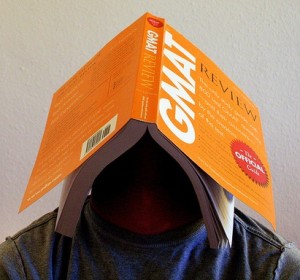Raise your hands if you’ve ever second-guessed whether your GMAT score is good enough. Now, keep your hands raised if you’ve scored over 720 and wondered the same thing. Thought so. Hands down please.
 There are very few applicants who haven’t at least wondered, if not worried, whether their candidacy is at risk due to their GMAT score. Here are a few considerations to help you make this assessment for yourselves:
There are very few applicants who haven’t at least wondered, if not worried, whether their candidacy is at risk due to their GMAT score. Here are a few considerations to help you make this assessment for yourselves:
There’s no such thing as a deal breaker
Those that have attended one of my “How To Get Into The Top Business Schools” presentations can tell you that this is a dominant theme. Other than an ethical violation, there really is no one element that would take an otherwise qualified candidate out of the running. My favorite example comes from the Harvard MBA Class of 2013 profile. The GMAT range of students in the incoming class is 490-790. 490!!! Is this a good target GMAT score for anyone applying to HBS? No, no it is not. It does however prove that if you’re an extraordinary candidate, you are going to get your chance. (On a side note, if that student is reading this, please contact me; I am honestly dying to know your story.)
Consider the 80% range
While the average/median GMAT is a useful gauge, most schools also publish the range in which 80% of their students GMAT scores fall each year. Generally, if you’ve gotten a score in the upper part of this range for your target schools (if not higher), that’s a good sign that admissions will be comfortable with your score.
Consider your Quant vs. Verbal breakdown
Don’t be misled, both are very important. However, as you know, an MBA program is highly analytical and quantitative by definition. So if one had to be called more important than the other, then yes, the schools will be particularly interested in your quantitative score. If you’ve got an especially lopsided split, such as 70% Q and 99% V, you might want to consider getting that quant score higher and taking the test again.
Consider your AWA score
Yes I said it. It’s not meaningless. If you have a 1.0 on the AWA, and an otherwise glowing application, what does that say about you? It could say that your English isn’t up to snuff–but the TOEFL should give a clear picture of that. It could say that you didn’t care enough to make the effort, which doesn’t reflect well on your work ethic or professional judgment. It also could say that you hired someone to write your essays for you, which is an ethical violation of enormous proportions. (Note: this is very different from working with a reputable MBA admissions consultant, who might help you with content strategy and editing, but not writing). So put your full effort into every section of the GMAT, and make sure that your AWA score reasonably reflects your writing ability.
Consider your background
If you’ve got substantial quantitative or analytical experience in your background—be it in work or school—and you can demonstrate high proficiency in those areas, then that will certainly help to demonstrate that you can handle the academic rigors of business school, even in the face of a lower GMAT score. On the flip side, someone with “softer” experience would benefit greatly from a score that really knocks it out of the ballpark. Ultimately, the admissions committee is looking for a snapshot of you today. How do you think? What can you make sense of? What can you handle?
Alternatives
GRE
The GRE is indeed a viable option today. Many b-schools now accept it, with no admissions advantage to the GMAT takers. So if you’ve already got a standout GRE score in your arsenal, submit it. If the GRE test locations or lower price tag are compelling for you, do it. Just be sure you’ve read each school’s GRE policy (and preferences, as a hint to those applying to Tuck). Only a small portion of MBA applicants are currently submitting the GRE (approx 4-5%), and many are in conjunction with a GMAT score or joint degree application.
Additional Experience
Say you’ve already given it 3 attempts without the results you were hoping. You’ve bombed every standardized test since the SAT, despite your otherwise stellar GPA, and you don’t anticipate overcoming your anxiety by next month. Your best alternative is to move on to the remaining aspects of the application you can control. Find ways to demonstrate your analytical proficiency by taking on (or creating) a project at work. Step up for a quantitative challenge in your extracurriculars or volunteer work. Or enroll in a continuing ed class in Statistics, Finance, or Accounting and get an A. Then let the schools know.
Going for gold
After all that, if you do decide to take the exam again, then give it every single thing that you’ve got.
If you prefer studying on your own, then get the right test prep books, take practice exams nonstop (practice writing those AWA essays too) and consider private tutoring or supplemental online modules (e.g., Dominate The GMAT) to help in your weaker areas. If you prefer the classroom setting, as many do, then research the well-known major players (e.g., Manhattan GMAT, Veritas Prep, Kaplan, Princeton Review), as well as the boutique companies in your local areas. Many of the large companies also offer online courses, in addition to online exclusive companies (e.g., Knewton). There are also phenomenal online forums available (e.g., Beat The GMAT) which consolidate tips, practice questions, and community.
Whatever your approach, stay in studying on weekends like everyone else is, and just get the best, best, best score you can. For this too shall pass, and the high score its worth its weight in option value – even if in your mind it’s just a reinforcement of the strengths you’ve already shown.
[To inquire about our partnership discounts for a number of GMAT programs, please don’t hesitate to contact us at info@shineadmissions.com]
© Hillary Schubach August 5, 2011 3:58pm
